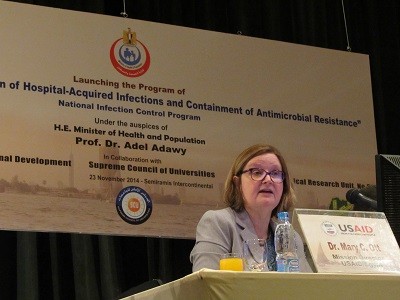
For Immediate Release
Cairo – Yesterday, the U.S. Government’s Naval Medical Research Unit- No. 3 (NAMRU-3) and the U.S. Agency for International Development (USAID) joined the Egyptian Ministry of Health and Population and the Supreme Council of Universities to scale up programs to monitor the level of antibiotic-resistant infections in Egyptian hospitals nationwide.
“Americans and Egyptians have a legacy of working together to promote the health and well-being of the Egyptian people,” said Dr. Mary C. Ott, USAID/Egypt Mission Director. “Working together to monitor the level of antibiotic-resistant infections in hospitals and build the reporting capacity of healthcare providers will help to improve health care for Egyptians.”
Bacterial infections acquired in hospitalized patients, and subsequent antibiotic resistance lead to disease complications, longer hospital stays, and increased costs of healthcare services. To combat the spread of hospital-acquired infections, the U.S. and Egyptian governments implemented a pilot project that monitors antibiotic-resistant infections in 42 ministry, university, and private sector hospitals and developed national infection control guidelines. Phase two of these projects will expand the program to all intensive care unit nationwide and provide hospitals with access to national electronic reporting of hospital infection data to optimize the use of antibiotics and build the reporting capacity of healthcare providers. It is hoped that these programs will lead to higher quality of health services in Egypt.
NAMRU-3, since its establishment at the invitation of the Government of Egypt in 1946, has partnered with the MOHP on infectious disease research. As a state-of-the art medical research laboratory, NAMRU-3 also coordinates with international partners, the World Health Organization, the U.S. Centers for Disease Control and Prevention (CDC) and USAID, to provide scientific excellence in research, training, and surveillance.
"NAMRU-3's mission of scientific excellence which includes collaboration with the MOHP is directly contributing to reducing disease among Egyptians, while also building the capacity for Egypt to address public health challenges such as hospital-acquired infections," said Capt. John Gilstad, NAMRU-3 Commanding Officer.
Over the past 30 years, the U.S. Agency for International Development has worked with the Egyptian people to upgrade clinics and hospitals; train thousands of health professionals; perform groundbreaking research; educate the population about health and family planning; modernize health sector policy and financing; and install efficient, modern information technologies and management systems in hospitals. USAID’s contributions have led to an 80% reduction in infant mortality and the 2006 declaration of a polio-free Egypt.







Comment
Make a general inquiry or suggest an improvement.